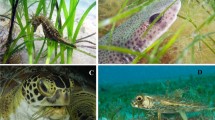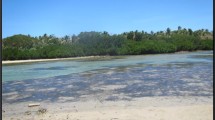Abstract
Dominant social and political constructions of ‘saltwater’ assume marine environments to be common property resources, justifying jurisdiction and management responsibilities by the State. However, in northern Australia ‘saltwater country’ is gaining recognition as a cultural landscape with customary law defining ownership and management rights and responsibilities. Samantha Muller looks at the role of the Dhimurru Sea Country Plan in asserting community-based management strategies through a self-defined planning process founded in local aspirations and concerns. She argues that in challenging statist discourses of saltwater ownership, management and planning, Dhimurru offers insights for ‘post-development in practice’.
Similar content being viewed by others
References
Banuri, Tariq (1990) ‘Modernization and its Discontents: A critical perspective on the theories of development’, in Frederique Apffel Marglin and Stephen Marglin (eds.) Dominating knowledge: Development, culture and resistance, Oxford: Clarendon.
Buku-Larrnggay Mulka Centre (1999) Saltwater. Yirrkala Bark Paintings of Sea Country, Neutral Bay, NSW: Jennifer Isaacs Publishing Pty Ltd.
Corn, Aaron and Neparrna Gumbula (2004) ‘Now Balanda Say We Lost Our Land in 1788: Challenges to the recognition of Yolngu law in contemporary Australia’, in Marcia Langton, Lisa Palmer and Kathryn Shain (eds.) Honour Among Nations? Treaties and Agreements with Indigenous People, Melbourne: Melbourne University Press.
Department of the Environment and Water Resources (DEW) (2007) The Indigenous Protected Area Programme. Available at http://www.environment.gov.au/indigenous/ipa/index.html (accessed 19 December 2007).
Dhimurru (2005) Yolnguwu Monuk Gapu Plan of Management. A Yolngu Vision and Plan for Sea Country Management in North-east Arnhem Land, Northern Territory: Dhimurru.
Dhimurru (2007) A Visitor's Guide: Recreation Areas – North East Arnhem Land, Darwin: Dhimurru Land Management Aboriginal Corporation.
Escobar, Arturo (1992) ‘Planning’, in Wolfgang Sachs (ed.) The Development Dictionary: A guide to knowledge as power, London: Zed Books.
Gibson-Graham, J.K. (2005) ‘Surplus Possibilities: Postdevelopment and community economies’, Singapore Journal of Tropical Geography 26: 4–26.
Gumana v Northern Territory of Australia (2007) ‘FCAFC 23’, Federal Court of Australia: Darwin.
Hoogvelt, Ankie (2001) Globalization and the Postcolonial World: The new political economy of development, Baltimore, MD: John Hopkins University Press.
Howitt, Richard (2001) ‘Frontiers, Borders, Edges: Liminal challenges to the hegemony of exclusion’, Australian Geographical Studies 39 (2): 233–245.
Howitt, Richard and Sandra Suchet-Pearson (2006) ‘Rethinking the Building Blocks: Ontological pluralism and the idea of “management”’, Geographical Analysis 88: 323–335.
Lahiri-Dutt, Kuntala (ed.) (2006) Fluid Bonds: Views on gender and water, Kolkata: STREE.
Luckert Marty, Bruce Campbell, Julian Gorman and Stephen Garnett (eds.) (in press) Investing in Indigenous Natural Resource Management, Charles Darwin University press, Darwin.
McGregor, Andrew (2007) ‘Development, Foreign Aid and Post-development in Timor-Leste’, Third World Quaterly 28: 155–170.
Muller, Samantha (in prep) ‘Accountability Constructions, Contestations and Implications: Insights from working in a Yolngu cross-cultural institution, Australia’, Geography Compass.
National Oceans Office (NOO) (2004) ‘Living on Saltwater Country’, in National Oceans Office (ed.) Review of Literature about Aboriginal Rights, Use, Management and Interests in Northern Australian Marine Environments, Hobart.
Russ, Garry R. and Dirk C. Zeller (2003) ‘From Mare Liberum to Mare Reservarum’, Marine Policy 27: 75–78.
Scott, Gray (2003) Fisheries Management: Issues of concern to aboriginal traditional owners in the northern land council region 1995–2003, Darwin.
Sithole, Bev, Peter Whitehead and Sean Kerins (in press) ‘Backound: Issues and the policy environment’, in M.K. Luckert, B. Campbell and J.T. Gorman (eds.) Investing in Indigenous Natural Resource Management, Charles Darwin University press, Darwin.
Yunupingu, Djawa (2007) ‘Fieldwork interview’, Djawa Yunupingu, Director Dhimurru Land Management Aboriginal Corporation, 19 October 2007.
Yunupingu, Djawa and Samantha Muller (in prep) ‘Dhimurru's Sea Country Planning Journey: Opportunities and challenges to meeting Yolngu aspirations for sea country management in Northern Territory, Australia’, Australasian Journal for Environmental Management.
Rights and permissions
About this article
Cite this article
Muller, S. Community-Based Management of Saltwater Country, Northern Australia. Development 51, 139–143 (2008). https://doi.org/10.1057/palgrave.development.1100465
Published:
Issue Date:
DOI: https://doi.org/10.1057/palgrave.development.1100465




